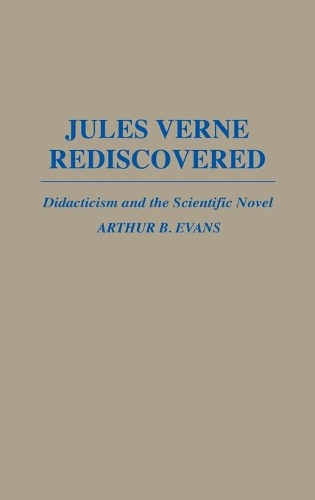
Jules Verne Rediscovered: Didacticism and the Scientific Novel
(Hardback)
Publishing Details
Jules Verne Rediscovered: Didacticism and the Scientific Novel
By (Author) Arthur B. Evans
Bloomsbury Publishing PLC
Praeger Publishers Inc
8th August 1988
United States
Classifications
Tertiary Education
Non Fiction
Literary studies: c 1800 to c 1900
843.8
Physical Properties
Hardback
224
Width 152mm, Height 229mm
539g
Description
This brilliant study of Verne's three cycles (1850-62, 1862-86, 1886-1916) analyzes the works from a biographical, sociohistorical, ideological, and narratological point of view. With a deep focus on Verne's pedagogical slant, Evans demonstrates convincingly the parallels between the French author's aim to `de-alienate' science and his aim to valorize learning, knowledge, and reading (his heroes conquer more knowledge for themselves and for the world). Choice This first modern American study of Jules Verne offers a wide-ranging reappraisal of a very familiar but often misunderstood author and his works. In spite of his status as one of the most translated novelists of all time, Verne and his Voyages Extraordinaires have long been neglected in American literary scholarship. This book seeks to reaffirm Verne's significant contribution to the development of early science fiction through a detailed investigation of his romans scientifiques. Evans has focused his study on the didactic dimension of Verne's narratives, which were originally intended to teach the rudements of science and morality to French youth through the medium of popular fiction.
Reviews
. . . Evans' book is a major, original contribution to an improved understanding of Jules Verne, and it helps us to comprehend better the SF of our own time. It may be profitably cited in future arguments as to the nature of science fiction.-Science Fiction & Fantasy
This brilliant study of Verne's three cycles (1850-62, 1862-86, 1886-1916) analyzes the works from a biographical, sociohistorical, ideological, and narratological point of view. With a deep focus on Verne's pedagogical slant, Evans demonstrates convincingly the parallels between the French author's aim to de-alienate' science and his aim to valorize learning, knowledge, and reading (his heroes conquer more knowledge for themselves and for the world). Like a vast romantic and didactic dream machine, Verne's science fiction encouraged both travel and the use of new" power of electricity. But can we attribute the signe of hierarchies to Verne Surely sclerotic societal orders existed in France before 1850. Many of the Virgilian echoes in the novels are missed as well; for example, the altruistic, rationalistic, competitive, and energetic Vernian scientist-hero recalls the Renaissance Man' in Aeneas. Evans should also consider adding a time chart to orient readers to 19th-century events. Indispensable for all large humanities collections.-Choice
." . . Evans' book is a major, original contribution to an improved understanding of Jules Verne, and it helps us to comprehend better the SF of our own time. It may be profitably cited in future arguments as to the nature of science fiction."-Science Fiction & Fantasy
"This brilliant study of Verne's three cycles (1850-62, 1862-86, 1886-1916) analyzes the works from a biographical, sociohistorical, ideological, and narratological point of view. With a deep focus on Verne's pedagogical slant, Evans demonstrates convincingly the parallels between the French author's aim to de-alienate' science and his aim to valorize learning, knowledge, and reading (his heroes conquer more knowledge for themselves and for the world). Like a vast romantic and didactic dream machine, Verne's science fiction encouraged both travel and the use of new" power of electricity. But can we attribute the signe of hierarchies to Verne Surely sclerotic societal orders existed in France before 1850. Many of the Virgilian echoes in the novels are missed as well; for example, the altruistic, rationalistic, competitive, and energetic Vernian scientist-hero recalls the Renaissance Man' in Aeneas. Evans should also consider adding a time chart to orient readers to 19th-century events. Indispensable for all large humanities collections."-Choice
Author Bio
ARTHUR B. EVANS is Assistant Professor of Romance Languages at DePauw University.
